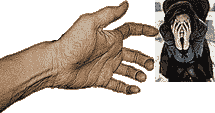Editor’s Note
(from cc&d v6, Oct 1993)
Janet Kuypers
Of the five senses we possess, which is the one we use the least? We use sight and sound constantly, we smell and taste our food three times a day. But we seldom pay attention to the sense of touch, unless during intimacy, for the most part. There are things around us everywhere that we touch, that we physically feel, but we never pay attention to. Try walking through your day looking for different textures, maybe in the chair you’re sitting on, or when passing through a marble hallway. Feel those surfaces. Understand objects in your environment for how they feel was well as how they look.
Once I was in an art gallery [the Smithsonian in Washington D.C.] with two friends of mine, and I gave this speech to them. We then proceeded to walk into a room with a bronze statue of the Crucifix against the wall. An interesting surface, my friend thought, so she walked up to it and began to feel the cold, smooth metal.
Of course, that’s when the guard from the other room ran in, yelling, “Hey! Don’t touch that!”, but the deed was done. And he’s probably still fearing that the bronze sculpture will crumble to pieces because she grazed it with her bare hand.
There are reasons for some pieces of artwork to be kept away from human hands - delicate, old materials can be kept longer. But to understand the beauty in touch can be as important as the beauty in sound and sight, even if it is in the most simple objects.
In writing and art, the author/artist tries to verbally/visually pull you in, so you physically feel every mood they are trying to portray. Another way this can be accomplished is through actual physical touch. And to interact with art can also make it that much stronger to the reader/viewer. Enclosed are some different textures, different surfaces, for you to physically sense, and some written work for you to emotionally react to. But remember that the purpose is to react - and to feel.


Copyright © 1993 Janet Kuypers.
All rights reserved. No material
may be reprinted without express permission.
|

![]()

![]()

![]()

![]()